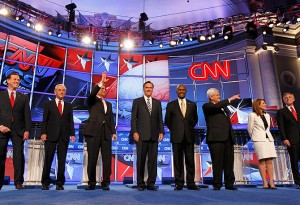On Nov. 22, I watched a televised Republican presidential primary debate on U.S. national security and foreign policy.
Symbolically, it took place at the historic Constitution Hall in Washington, D.C., and was hosted by CNN, in partnership with The Heritage Foundation and American Enterprise Institute, and moderated by Wolf Blitzer. It has been reported that the debate was watched by 3.6 million American viewers. Well, I was one of them.
What is the mortal danger to the free countries today? It is the attack by the slave countries, and the PRC in particular. What should the free countries do to save themselves? These questions were neither asked, nor were they answered: they were not even posed by the moderator of the debate.

Those living in the young free countries, such as the United States, are naturally busy enjoying their freedom in pursuit of happiness.
The happiness of our family — myself, my wife, and our son, who had miraculously escaped from Stalin’s paradise — has contributed to our experience and knowledge of the Soviet hell to help save free countries from being exterminated by countries like Stalin’s Russia or today’s “People’s Republic of China.”
We may be asked, Why do those old unfree societies so frantically desire to own the world, as stipulated by Chairman Mao and based on idiotic theories of that infamous German, Karl Marx? Let me now mention one event. Just like Russia before Stalin, Germany before Hitler had created the music and science of genius.
Under Hitler, the German physicists continued to work on a nuclear program. They were engaged in secret nuclear research to create nuclear weapons. One of German scientists of genius, Albert Einstein, understood the potential danger of nuclear research going on in Hitler’s Germany for the free world. He and his family managed to flee from Hitler’s Germany to the United States. Einstein sent several messages to President Franklin Delano Roosevelt on the ongoing nuclear research in Hitler’s Germany, and advised him how urgent it was for America to get the nuclear weapons ahead of Hitler’s Germany.
So, if it were not for Einstein’s courageous and patriotic warning, the United States would have been blissfully unaware of how close Hitler was to getting the nuclear bomb.
Had Hitler had nuclear weapons in his possession early enough, he would have defeated Russia and Western Europe and would finally conquer the entire world. Without nuclear weapons, Hitler lost his war in Russia and committed suicide by shooting a pistol through his mouth and blowing his brains out, which is regarded by “Analysis of the Brain” as the organ of human intelligence.
Do the free countries, and the United States in particular, have secret, top-intelligence informants to keep the country abreast of what secret military weapons are being developed in the PRC? Or do the bureaucratic institutions count on another miracle to save them from destruction?
As I was writing this, my wife rushed into my study with the words: “If you don’t want to miss the Republican debate on national security and foreign policy, go watch it right now!” And so I did, anxious to hear from the aspirants to the highest post in the land what they think about the political situation in today’s world and what they would do if confronted with another world war.
The eight Republican presidential hopefuls lined up and moved to their rostrums, ready to unveil their wisdom as to how they will handle national security and American foreign policy.
Strange as it may sound, nothing of the sort happened, that is, nothing that I hadn’t heard before, except for the meaningless, trite questions from the mediator and equally trite answers from the respondents. From time to time there would be some bickering among the participants as to how to end (or not to end) gracefully the American presence in Iraq or Afghanistan or whether it makes sense to continue financial aid to Pakistan.
The only notable exception was Rep. Ron Paul, R-Texas, who stood in the debate very much alone. Paul’s positions on various aspects of national security are unique. The libertarian-leaning Ron Paul’s main concern has always been adherence to and the preservation of American values, American liberties as guaranteed by the American Constitution, the great American document that has served the country so well for over 200 years.
Ron Paul was critical of any attempt to reinterpret any part of the Constitution at the expense of undermining American liberties, any attempt to reinterpret the Constitution to justify, for example, some military actions abroad to suit the political agenda of the day.
The other candidates, however, were presenting their own views on how they would pursue American foreign policy their own way.
Lev Navrozov can be reached by e-mail at levnavrozov@gmail.com.

